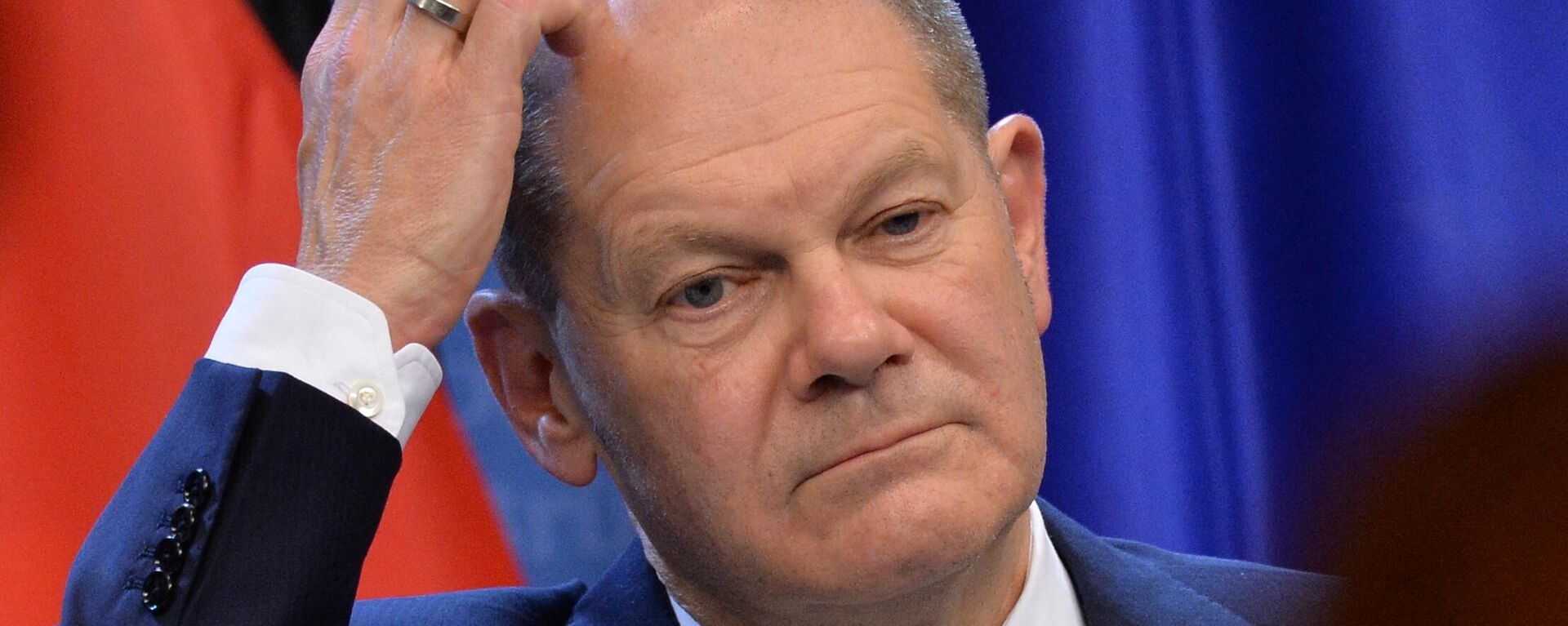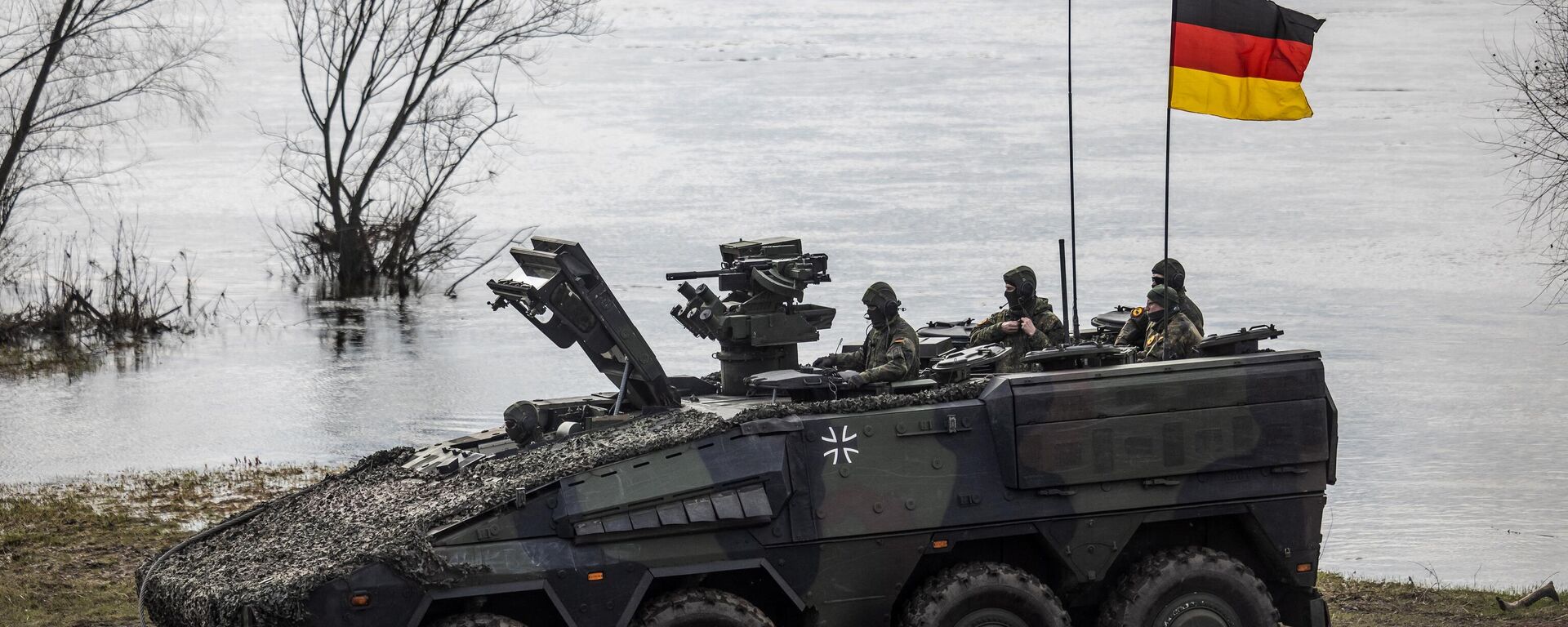Bundeswehr's Audio Ignites Blame Game in Germany
18:28 GMT 05.03.2024 (Updated: 18:29 GMT 05.03.2024)

© Sputnik / Alexey Vitvitsky
/ Subscribe
The audio recording of the conversation between German military officers on “scenarios” of a possible strike by Taurus missiles against the bridge linking the Russian mainland (Crimean bridge) with the Crimean peninsula led to a flurry of political accusations and some soul-searching on gender politics in Germany.
German political elites lashed out at chancellor Scholz for dragging his feet on the issue of sending Taurus missiles to Ukraine. (The recording revealed that their use was technically possible without German “boots on the ground.”) Meanwhile, his Social Democrats appealed to the public’s survival instincts, saying that sending Taurus missiles might eventually trigger a major response from Russia.
Süddeutsche Zeitung reported that Germany’s main opposition party, the Christian-Democratic Union (CDU), accused Germany’s chancellor Olaf Scholz of having lied to the public.
In what way? The CDU’s Bundestag deputies noticed that the recording contradicted the statements of Scholz in which he refused to send German Taurus missiles to Ukraine, because such an operation, in his words, would have required ‘technical assistance’ from Berlin, with German military personnel on the ground.
Germany claims that it has no military personnel in Ukraine and will not have it there, because this would put Berlin at risk of a war with Russia.
“The reports that we have seen are just embarrassing. It looks like the chancellor has been justifying his refusal to send Taurus missiles [to Ukraine] by stating falsehoods,” said Alexander Dobrindt, the head of the Bundestag faction of Christian-Social Union (CSU), CDU’s Bavarian coalition partner, in an interview to Süddeutsche Zeitung.
The CDU’s spokesman on military issues, Roderich Kiesewetter, said that a special “investigative committee” should find out, why the chancellor said that Bundeswehr’s participation was absolutely necessary, when this “could very well not be the case”.
The CDU has long been pushing for more military aid to Ukraine than the current chancellor Olaf Scholz, a Social Democrat, was ready to deliver.
On the other side, as The Financial Times reports, the leaked conversation amounted to a massive breakthrough for Moscow in destroying NATO's narrative, because “it proved that the collective West had designs to attack Russia.”
Germany has for a long time been denying that its military have plans to attack Russia – directly or through some kind of a proxy. Meanwhile, the four German officers, whose conversation was recorded, discussed precisely that – how could Germany’s Ukrainian proxies make a strike against the Crimean bridge, using 10-20 German made Taurus missiles.
While the political elite blamed Scholz, German public got worried by the fact that their country’s military discussed something chancellor Scholz said he wanted to avoid – a dangerous confrontation with Russia. This could attract some sympathies to Scholz, especially inside his formerly peace-loving Social-Demcoratic party.
“People here like the way Scholz cautiously weighs up the pros and cons of supplying different weapons systems,” the FT quotes Nils Schmid, the Social Democrats’ foreign policy spokesperson, as saying. “Like Scholz, they don’t want Germany to become a party to this war.”
Rolf Mützenich, the head of Social Democrats’ parliamentary group, is quoted by FT as saying “Scholz’s decision to avoid sending Taurus is politically and legally reasonable.”
Cherchez la femme? The dangerous field of gender politics
Those observers who are less interested in party politics, raised the more simple question: how could the conversation be recorded by Russians in the first place?
Germany’s defense minister Boris Pistorius blamed one of the four officers recorded. Bild-Zeitung made a guess that it was brigadier general Frank Greffe. He is reported to have joined the conversation from Singapore via an insecure connection.
But Julian Reichelt, former editor-in-chief of the digital edition of Bild Zeitung and one of Germany’s best known journalists, saw some connection to Germany’s radical gender politics here.
Reichelt blamed the head of Bundeswehr’s Military Counterintelligence Service (MAD) Martina Rosenberg, whose office is responsible for preventing foreign intrusion into the Bundeswehr’s activities, but seems to have been looking the other way in this case.
Here is what Reichelt wrote in social networks:
“Martina Rosenberg, as the head of Military Counterintelligence Service, is directly responsible for the phone-tapping disaster that happened to Bundeswehr. This is what happens when you appoint a former “head of the department for social affairs and gender equality” without espionage experience the head of a German special service. And in this case it happened, because someone wanted by all means to have “the first military counterintelligence service headed by a woman.”
Martina Rosenberg’s MAD is responsible for monitoring members of Germany’s armed forces with the aim of preventing possible extremist or espionage activities on their part.
In her previous interviews, Martina Rosenberg paid special attention to “fighting right-wing extremism among the women and men of Bundeswehr” and singled out “Russian and Chinese special services” as the most dangerous enemies of MAD.
Trio Infernale: von der Leyen, Kramp-Karrenbauer and Lambrecht
A German investigative site danisch.de, which has been reporting on political affairs in Germany since 1998, came up with the following comment:
“It has long been the case that incompetent women were put in important positions in Germany, with no attention being paid to their professional abilities. The main requirement is to be a politically correct woman. The feminist battle cry is ‘Quality is a myth,’ and the mere notion of competence is dismissed as an invention of white males. I don’t see anything in her [Martina Rosenberg’s] portfolio that would qualify her for the top job in MAD. But I see a lot in common between her and the Trio Infernale of Ursula von der Leyen, Annegret Kramp-Karrenbauer and Christine Lambrecht, which in turns have been heading Germany’s ministry of Defense for most of the last ten years.”
The new German defense minister Boris Pistorius, who happens to be the first man on the job after a string of the afore-mentioned women since 2013, wisely avoided any gender-related comments on the matter. Instead he blamed Russia for “setting the agenda for political discussions in Germany” during the last “few weeks or may be even months.”




